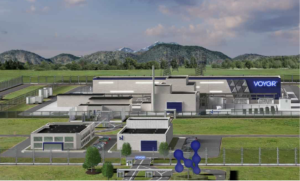
By Steve Haner
Fool me once, shame on you. Fool me twice, shame on me. A utility-backed bill to stick electricity ratepayers with the high-risk costs of developing small (modular) nuclear reactors, approved by a Senate committee Friday, is a “fool me twice” example. Shame on the General Assembly if it falls for it.
The utilities, well Dominion Energy Virginia at least, pulled the same trick in 2014 and a compliant General Assembly stuck its ratepayers with about $400 million in costs to develop a third reactor at North Anna. Did they promise to build that when pushing the bill? Yes. Did they ever build it? No.
Speaking that truth to the Assembly that year, that Dominion had no intention of building North Anna 3 and was simply gaming its own customers, was uncomfortable for me and I paid a price. In a room full of rent-seeking lobbyists and corporate executives, however, the other opponents and I were right.
Under this legislation the same outcome is very likely, and the bill may never produce a small modular reactor. There is nothing in the bill forcing Dominion or Appalachian Power Company in Western Virginia to build anything. The Assembly members in love with the idea of an SMR have totally lost sight of their responsibility to protect their constituents. Quelle Surprise.
The bill before Senate Commerce and Labor this morning was Senate Bill 454, sponsored by David Marsden, D-Fairfax. The comparable bill from 2014 was sponsored by then-Senator Walter Stosch, R-Henrico, one of my former bosses in my political staff days. A good summary story from the time in the once-more- vigorous Richmond Times-Dispatch is still on its archive.
Apparently the 2024 introduced bill was dropped at the last minute and the committee was given a new substitute version, the classic ambush by substitute play. The substitute version expands the list of costs that Dominion or Appalachian can get recovered from ratepayers even if no plant is built to add a profit margin. Again, anybody surprised?
Even the offshore wind boondoggle wasn’t given this treatment because that project was going to be built. These special rules demanded are all the proof anybody should need that SMRs remain uncharted, highly risky territory and the company bosses are not at all committed. Once again, they will protect their profits and stockholders first and last.
As is far too common, the impact statement from the SCC itself makes no mention of the potential ratepayer costs this bill would impose, let alone tried to project them.
The bill cleared on an 8-7 vote. There was a House version of the bill that is already dead, but this new substitute – which the utilities rose in committee to support – could revive the idea. The Virginia Manufacturers Association and my former employer, Huntington Ingalls Industries, testified for it. Governor Glenn Youngkin (R) is also a fan of this technology, but if it lands on his desk, he should resist it.
No SMR project should proceed, and no customer should be charged a dime for it, until and unless the State Corporation Commission has held a full, open proceeding under oath and determined the project itself is needed, reasonable and prudent. As critics of this bill pointed out, a similar law in South Carolina stuck ratepayers there with billions of dollars of costs on a failed project that produced zero kilowatts of electricity.
During the 2007 negotiations to return Virginia to full electricity regulation, utilities asked for and received permission to begin to charge customers for new generation projects while they were underway. Under traditional utility law, customers are not charged until the power starts to flow. But the 2007 law still required full SCC approval of the underlying project before customers could be charged during construction.
I’m not the only person who was in the room where that happened who remembers that. It seems I may be the only one who still understands how important it is to protect consumers by maintaining that approach.
If America, the world actually, wants a 21st century economy without fossil fuels, and still wants 24-7-365 reliable power, nuclear is the way. Other countries are far ahead of us in recognizing this. Watch this great update. The U.S. regulators need to agree on one, maybe two, full size reactor designs, and one or two modular designs, and then when 30 or 40 such projects are underway the benefits of serial reviews and construction will lower the costs and risks.
The hearing Friday saw several environmental groups standing to oppose the bill, citing their concern for the ratepayer cost. “There is no electricity at the end of this bill,” one said, mirroring my 2014 argument. It was clear some of the Republicans doubted their sincerity and assumed they just don’t like nuclear power. There is no larger nuclear fan than I am (although many know the industry better), and I also think this is a very bad bill.

Leave a Reply
You must be logged in to post a comment.